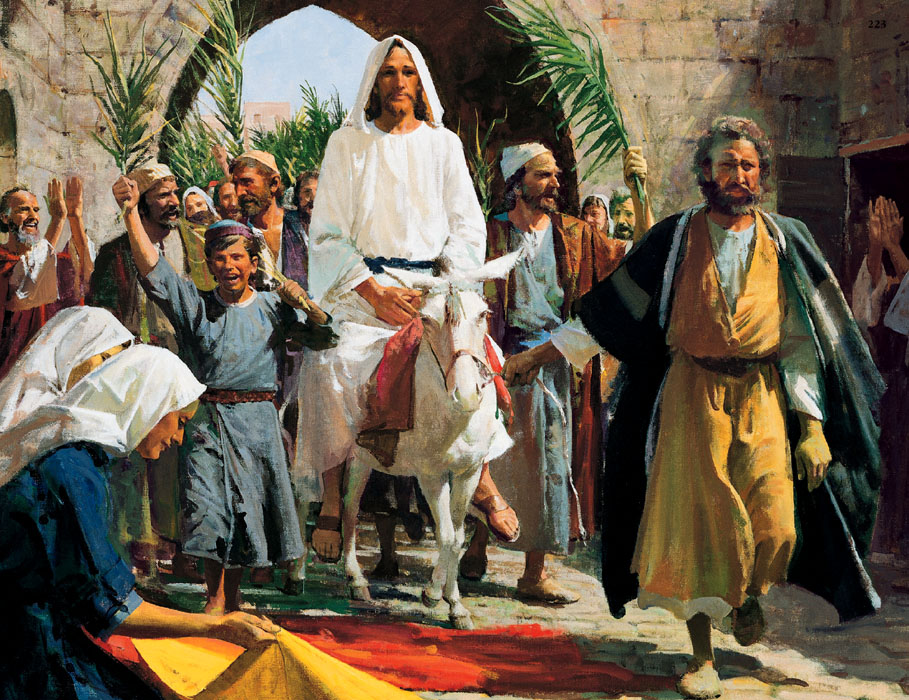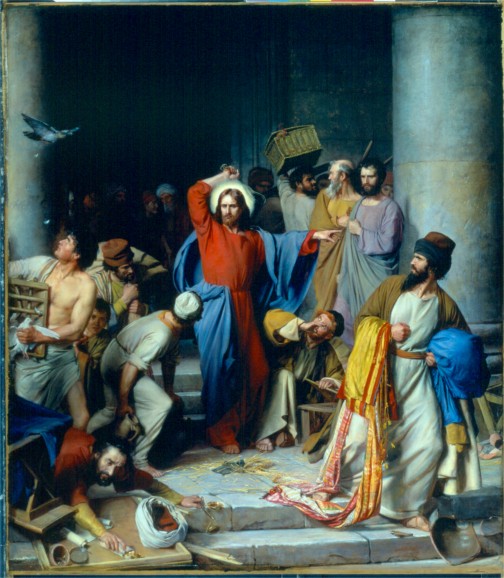|
Scriptural Text [& Editorial]
|
Commentary & Explanation
|
Footnotes ~ References ~ JST
|
 CHAPTER 21
CHAPTER 21
Jesus rides in triumph into Jerusalem—He cleanses the temple,
curses the fig tree, and discusses authority—He gives the parables of
the two sons, and the wicked husbandmen.
|
|
|
1 AND when they drew nigh unto Jerusalem, and were come to Bethphage, unto the mount of Olives, then sent Jesus two disciples,
2 Saying unto them, Go into the village
aover against you, and straightway ye shall find an ass
tied, and a colt with her: loose them, and bring them
unto mea.
3 And if any man say ought unto you, ye shall say, The Lord hath need of them; and straightway he will send them.
|
2a loose them, and bring
them unto me The two italicized 'them' were added in the
translation. They make it consistant with the prophecy in Zechariah 9:9,
that he would ride on an ass and a colt of an ass. Whether the rendering in
Zechariah is correct and thus Christ did ride upon both the ass and her colt
is truly of little consequence. Of interest, in the Mark and Luke account it
is only the male colt which is brought and riden upon (Mark 11:1-6 and Luke
19:28-34). Certainly it is more unique and theatrical for one man to ride
upon two beasts than to just ride upon one. Perhaps this was the uniqeness of
the prophecy in its fulfillment. The bottom line is that Jesus did fulfill
the prophecy as it was originally given by Zechariah and contained in his
book. And in either case, it was fulfilled in Jesus.
|
1a
D&C 128:20;
2a
Mark 9:2 (2-13);
Luke 9:29 (28-36);
John 1:14;
2 Pet. 1:16 (16-19);
TG
Jesus Christ, Glory of;
|
4 All this was done, that it might be fulfilled which was spoken by the prophet, saying,
5 Tell ye the daughter of Sion, Behold, thy
aKing cometh unto thee, meek, and sitting upon an ass, and
a colt the foal of an ass.
|
|
1a
D&C 128:20;
2a
Mark 9:2 (2-13);
Luke 9:29 (28-36);
John 1:14;
2 Pet. 1:16 (16-19);
TG
Jesus Christ, Glory of;
|
6 And the disciples went, and did as Jesus commanded them,
7 aAnd brought the ass, and the
colt, and put on them their clothes, and they set him thereon.
8 And a very great multitude spread their garments in the way; others cut down branches from the trees, and strawed them in the way.
|
|
1a
D&C 128:20;
2a
Mark 9:2 (2-13);
Luke 9:29 (28-36);
John 1:14;
2 Pet. 1:16 (16-19);
TG
Jesus Christ, Glory of;
|
9 And the multitudes that went before, and that
followed, cried, saying, aHosanna to the Son of David:
bBlessed is he that cometh in the name of the Lord;
Hosanna in the highest.
10 And when he was come into Jerusalem, all the city was moved, saying, Who is this?
11 And the amultitude said, This is
Jesus the prophet of Nazareth of Galilee.
|

|
|
12 ¶ And Jesus went into the temple of God, and cast
out all them that sold and bought in the temple, and overthrew the
tables of the moneychangersa, and
the seats of them that sold doves,
13 And said unto them, It is written, My
ahouse shall be called the house of
bprayer; but ye have made it a cden of
thieves.
Passover Temple Tax
While all sacrifices of the covenant were those of animal or harvest produce
and volentary, once a year a 'temple tax', a tax of use or worship, was to be
paid. This was not an optional payment of free will. It was a required
assessment on every adult male counted in Israel of age 20 and above, poor
and rich alike. The amount of the assessment was about two days wages or half
a skekel or called a 'bekah'. This was a shekel of silver whose weight at the
time of Christ was 218 grains (15.126 grams). This 'tax' was established
anciently by the Law of Moses (Ex. 30:11-16, Ex. 38:26)
Now, what the 'exchange rate' would be
in terms of Greek and Roman coinage relative to the 'Temple Half Shekel'
could likely vary similar to the variance of money exchange rates between
defering nations of the world today and coul be collected in increase in
price of the Shekel and/or in the 'service price' charged by the moneychanger.
Since the common legal coinage acceptable in the realm of the Roman Kingdom
would be that of Rome, which would be Greek and Roman coins; what a man would
be paid in and carry with him was the money of Rome. The expesive coin of
the temple would not be acceptable to Rome nor used in common daily
transactions.
|

12a overthrew the tables of the
moneychangers Every Passover, by the Law of Moses, every male in
Israel was to pay a 'temple tax' of two days wages, which was half a shekel.
But the tax could not be paid in the common money of the day, in Greek or
Roman coinage. That was deemed to defy the temple. Thus a 'specail coin of
the Temple' was created which had to be first bought of the 'moneychangers'
and then paid to the Temple Priests. And to such 'moneychangers' an additional
fee would have to be paid for their 'service' of providing the 'exchange'
at the 'moneychanger tables'. The irony was that while the Greek and Roman
coins were deemed unacceptable in the temple and had to be exchanged into
the coin of the Temple, the 'exchange' could take place in the temple. These
were the tables over turned by the Lord.
|
|
14 And the blind and the lame came to him in the temple; and he healed them.
15 And when the chief priests and scribes saw the
wonderful things that he did, and the achildren crying in
the temple, and saying, Hosanna to the Son of David; they were sore
displeased,
16 And said unto him, Hearest thou what these say? And Jesus saith unto them, Yea; have ye never read, Out of the mouth of babes and sucklings thou hast perfected praise?
|
|
|
17 ¶ And he left them, and went out of the city into Bethany; and he lodged there.
18 Now in the morning as he returned into the city, he hungered.
19 And when he saw a fig tree ain
the way, he came to it, and found nothing thereon, but leaves only, and said
unto it, Let no bfruit grow on thee henceforward for ever.
And cpresently the fig tree withered away.
|
|
|
20 And when the disciples saw it, they marvelled, saying, How soon is the fig tree withered away!
21 Jesus answered and said unto them, Verily I say
unto you, If ye have afaith, and bdoubt
not, ye shall not only do this which is done to the fig tree, but also
if ye shall say unto this cmountain, Be thou removed, and
be thou cast into the sea; it shall be done.
22 And all athings, whatsoever ye
shall bask in cprayer, believing, ye
shall receive.
|
|
|
23 ¶ And when he was come into the temple, the
chief priests and the elders of the people came unto him as he was teaching,
and said, By what aauthority doest thou these things? and
who gave thee this authority?
24 And Jesus answered and said unto them, I also will
ask you one thing, which if ye tell me, I in like wise will tell you by what
aauthority I do these things.
25 The baptism of John, whence was it? from heaven, or of men? And they reasoned with themselves, saying, If we shall say, From heaven; he will say unto us, Why did ye not then believe him?
26 But if we shall say, Of men; we fear the people;
for all hold John as a aprophet.
27 And they answered Jesus, and said, We cannot tell. And he said unto them, Neither tell I you by what authority I do these things.
|
|
|
28 ¶ But what think ye? A certain man had
two sons; and he came to the first, and said, Son, go awork
to day in my vineyard.
29 He answered and said, aI will
not: but afterward he repented, and went.
30 And he came to the second, and said likewise. And
he answered and said, I go, sir: and awent
bnot.
31 Whether of them twain did the will of his father? They say unto him, The first. Jesus saith unto them, Verily I say unto you, That the publicans and the harlots go into the kingdom of God before you.
32 For John came unto you in the way of
arighteousness, and ye bbelieved him not:
but the cpublicans and the harlots believed him:
dand ye, when ye had seen it, repented not
afterward, that ye might believe him.
|
|
|
33 ¶ aHear another parable:
There was a certain householder, which planted a vineyard, and hedged it
round about, and digged a winepress in it, and built a tower, and let it out
to bhusbandmen, and went into a far country:
34 And when the time of the fruit drew near, he sent his servants to the husbandmen, that they might receive the fruits of it.
35 And the husbandmen took his
aservants, and abeat one, and killed
another, and stoned another.
36 Again, he sent other servants more than the first: and they did unto them likewise.
|
|
|
37 But last of all he sent unto them his son, saying, They will reverence my son.
38 But when the husbandmen saw the son, they said
among themselves, This is the aheir; come, let us kill him,
and let us seize on his inheritance.
39 And they caught him, and cast him out of the vineyard, and slew him.
|
|
|
40 When the lord therefore of the vineyard cometh, what will he do unto those husbandmen?
41 They say unto him, He will miserably destroy those
wicked men, and will let out his avineyard unto
other husbandmen, which shall render him the fruits in their seasons.
|
|
|
42 Jesus saith unto them, Did ye never read in the
scriptures, The astone which the builders
brejected, the same is become the head of the
ccorner: this is the Lord's doing, and it is marvellous in
our eyes?
43 Therefore say I unto you, The
akingdom of God shall be btaken from you,
and cgiven to a dnation bringing forth
the fruits thereof.
44 aAnd whosoever shall fall on
this stone shall be broken: but on whomsoever it shall fall, it will grind
him to powder.
|
|
|
45 aAnd when the chief priests and
Pharisees had heard his parables, they perceived that he spake of them.
46 But when they sought to lay hands on him, they
feared the multitude, because they took him for a prophet.
|
|
|
|
|
|
|
|
|
|
|
|
|
|
|